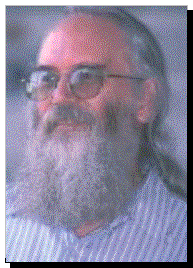Murphy's internet
 The Internet Corporation for Assigned Names and Numbers has been inching along for years towards the moment when its tether to the US government is severed. This week, the Oxford Internet Institute and ICANN convened a meeting to outline the plans for the multi-stakeholder replacement structure. For someone who remembers the domain name system when it was just Jon Postel, ICANN's ever-more-complicated org chart is still pretty startling.
The Internet Corporation for Assigned Names and Numbers has been inching along for years towards the moment when its tether to the US government is severed. This week, the Oxford Internet Institute and ICANN convened a meeting to outline the plans for the multi-stakeholder replacement structure. For someone who remembers the domain name system when it was just Jon Postel, ICANN's ever-more-complicated org chart is still pretty startling.
Monday's discussion started with a group of presentations explaining the new structure and the planned provisions in the bye-laws intended to protect ICANN from capture by governments - or other large self-interested organizations - either individually or collectively - and the rest of us from overstepping by ICANN. Both concerns are as old as ICANN, as are accountability and transparency. The bye-laws being written to implement the agreement reached a few weeks ago in n what sounds like a tortuous conclave in Marrakesh are intended to solve all these issues.
The transition requirements set by the National Telecommunications and Information Administration, the section of the Department of Commerce that has had ICANN under contract all these years, reflect these same values, with an added focus on "multistakeholder". NTIA, ; ICANN's ICANN vice-president Jean-Jacques Sahel said Monday to open the meeting, would not accept a proposal that replaced NTIA with a multi-government or intergovernmental solution. But it's as reasonable to be concerned about capture by the large companies that can afford funding for representatives, as Kieren McCarthy reported French government officials complained after Marrakesh, claiming that the result gives too much power to GAFA (Google-Apple-Facebook-Amazon); others doubtless agree. Either way, it means nerts to the ITU, the agency of the United Nations that thought back in 1997 (and again in 2012) that it was the natural choice.
 Writing in the Guardian, the consultant Maria Farrell, who has both worked for ICANN and represented civil society on its GNSO, outlines the process by which the present arrangement was reached, calling the multistakeholder model "slightly mysterious". On Monday, speakers suggested it may be unprecedented: a non-governmental multistakeholder corporation devised to govern a piece of critical international infrastructure. I sense future PhD dissertations.
Writing in the Guardian, the consultant Maria Farrell, who has both worked for ICANN and represented civil society on its GNSO, outlines the process by which the present arrangement was reached, calling the multistakeholder model "slightly mysterious". On Monday, speakers suggested it may be unprecedented: a non-governmental multistakeholder corporation devised to govern a piece of critical international infrastructure. I sense future PhD dissertations.
The big question, several of us agreed before the floor was opened to questions, is "what can go wrong"? Essentially, we were assuming Murphy's Law's evil twin: "Anything that can be gamed, will be gamed."
There are at present two workstreams in progress, Matthew Shears from the Center for Democracy and Technology explained. The first is covering all the things that have to be finished before September's handover: changing bye-laws and ensuring accountability. The second workstream, intended to complete by the end of this year, is focused on issues whose solutions don't have to be in placer before transition. The latter effort, he said, needs to find ways to encourage greater diversity, ensure the accountability of stakeholder groups; and handle bye-law changes that for now are placeholders until agreement can be reached. The two biggest of these are human rights and jurisdiction.
Jurisdiction is the question of where legal disputes should be settled. For the last 15 years that's been California, but the legal implications have to be thought through.
It's human rights that's the really difficult question. Even if you have consensus on exactly what "human rights" means in this context, what should ICANN's role be? The Internet Governance Project's 2014 analysis of the then-current situation highlights some of the inherent difficulties and collisions. If ICANN were to get into the business of blocking content on human rights grounds, how far should it go and why does it get to stop at human rights? A similar conflict arises around privacy: how much should you be required to disclose about yourself as the owner of a domain name? The meeting raised questions about ICANN's funding model (Chatham House Fellow Emily Taylor noted that 55% of ICANN's funding come from just two domain name registrars, Verizon and GoDaddy) and what support should be available to those attending its far-flung meetings.
A questioner speculated that ICANN might be too big for the narrowness of its mission. Domain names have become progressively less important with the rise of search engines and social networks. Will ICANN need to scale down, or find legitimate new governance functions to justify its size? The latter strikes me as the biggest temptation towards mission creep.
But alongside that may be the professionalization that Sahel believes will now come to this area, which until now has been dominated by volunteers. As a result, Taylor suggested, the people taking over will gradually become businesspeople interested in doing deals. "It will take the heart out of the decision-making process." This leads into a thought I didn't have time to express: how do we keep ICANN from becoming like the ITU, which is despised by many internet cognoscenti as having stalled technical innovation and development for decades?
So this is what change looks like, as Farrell said: very, very slowly, and then very quickly. Right now, we're still in the slow bit where decisions are being made, so anyone can contribute by joining a working group, submitting comments, or, at the very least, staying up-to-date on developments..
Wendy M. Grossman is the 2013 winner of the Enigma Award. Her Web site has an extensive archive of her books, articles, and music, and an archive of earlier columns in this series. Stories about the border wars between cyberspace and real life are posted occasionally during the week at the net.wars Pinboard - or follow on Twitter.